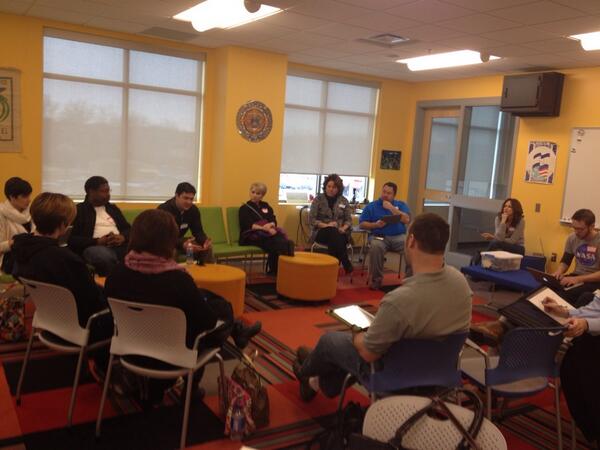We did it.
Saturday, October 4, 2014, was the inaugural “edcampDubC”, held on the campus of Wilmington College in the Boyd Cultural Arts Center.
After I had attended my first edcamp (edcamp Columbus, 3/9/2013) I started asking myself, “Could that work in the rural region where I live?” The collaboration and energy and enthusiasm during edcamp made me want more of it. And I wanted to believe that I didn’t have to drive two hours for it.
The most important component to making this happen was that it couldn’t just be my idea and my edcamp. If I couldn’t find a few people who were excited enough about the concept to make it happen as I was, we would never be able to bring people together for conversations.
I am fortunate enough to be part of a Regional Advisory Council that includes just the people I wanted to bring to the table for such an event: Gary Greenberg from CET/ThinkTV, Deb Tschirhart from SOITA, Michele Beery from Wilmington College. The resources and talents that they brought to the table for this event were indispensable. EdcampDubC would not have happened without them.
About 40 individuals made it to the Boyd Cultural Arts Center for edcampDubC. I had been told by other edcamp organizers to expect about a 50% no-show rate. While we had a small-ish group (about 40), we did have more than 50% show up, and a few at-the-door registrations!
What went well:
The facility. The Boyd Cultural Arts Center was a fantastic facility. The T. Canby Jones Meeting House (an actual Quaker meetinghouse, attached to Boyd Center) made a great opening and closing gathering place. The classroom spaces were very good, with available projectors and sound. There was also an on-site art gallery (featuring Nelle Ferrara’s “Bold Abstractions“), and the Quaker Heritage Center exhibit “The Pity of War: Words and Images of World War I“. There was plenty to see and do and learn about before ever entering a classroom.
Registration. I took the idea of using Eventbrite from the organizers of edcampCbus, and I am so glad I did. The ticketing and check-in process was smooth as silk. The only think I did wrong was to set the tickets to stop being available at 7:30am the day of the edcamp. I had to change that to later in the day to allow at-the-door registrations during the 8:30-9:00 check-in time.
Variety and amount of sessions. edcampDubC was advertised through several different avenues. We had a good mix of veteran educators, pre-service teachers, Wilmington College faculty, and new teachers in Resident Educator programs. This provided the perspectives needed for rich, dynamic discussions of many different topics, and made it difficult to decide which sessions to go to! View the final session board.
Great giveaways. Sponsorship was not a problem for this event. Squirrels, IPEVO, Flocabulary, SimpleK-12, Kahoot!, Voki, StoryboardThat, Zaption, and Edutopia all sent items for door prizes at the end of the day! By adding our edcamp to the calendar of edcamps at edcamp.wikispaces.com, we actually had vendors contacting us requesting to send us promotional items to give away!
I need to give a special shout-out to Squirrels for sending Rebecca Moore to participate in the event and get a first-hand look at what edcamps are all about!
What we can improve next time:
Representation. I would have liked to have more area administrators at the event. I don’t think there were any superintendents or building principals. In order for the ideas that came to light at edcampDubC to continue and grow, building and district leadership will have to be on board. We need their perspective in the discussions.
Growth. We had quite a few people who were the only person from their school building/district to attend. If every one of those educators will come back next year, and bring one or two colleagues, edcampDubC will grow quickly, and be a better event for it.
Social Media Presence. Several attendees contributed to the social media discussion of the event during the day, but we didn’t do a very good job of emphasizing it in the edcamp registration materials or during the opening session. Still, there is a good snapshot of what happened during the day via the edcampDubC Facebook page, the #edcampDubC hashtag on Twitter, and a good collection of photos on Pinterest.
Final thoughts:
This was a lot of work. But it was fun work!
At the end-of-day Smackdown, one attendee said, “I was hesitant to come to this. I like to know ahead of time what I’m going to learn and what the objectives are. But I had a great time today, and learned more than I expected to!” Comments like that, and making some new friends from various places, made all the effort worthwhile!
The following quote from former Wilmington College professor of religion and philosophy, T. Canby Jones, captures the essence of what edcampDubC, and edcamps in general, sought to establish:
“Every student is a teacher and every teacher a student because each hungers to be taught by the voice of Truth speaking through the other.”
– T. Canby Jones, Professor Emeritus of Religion and Philosophy
